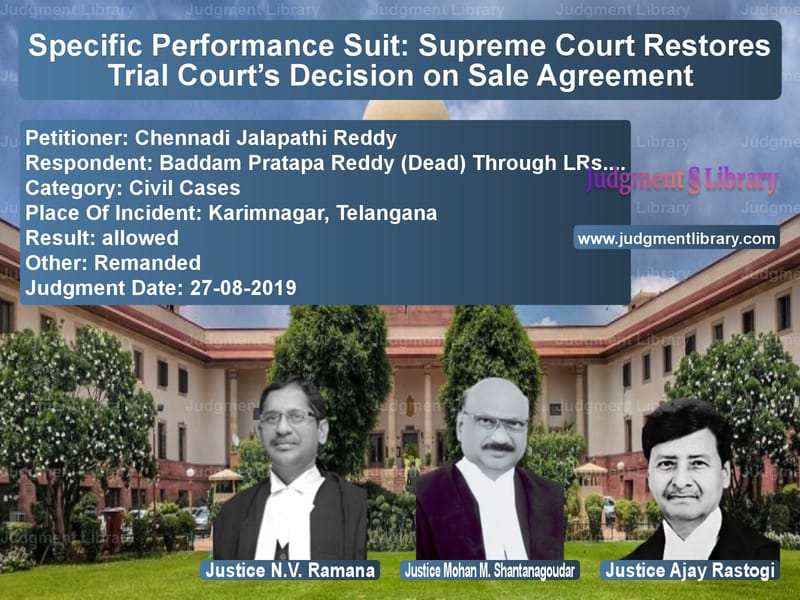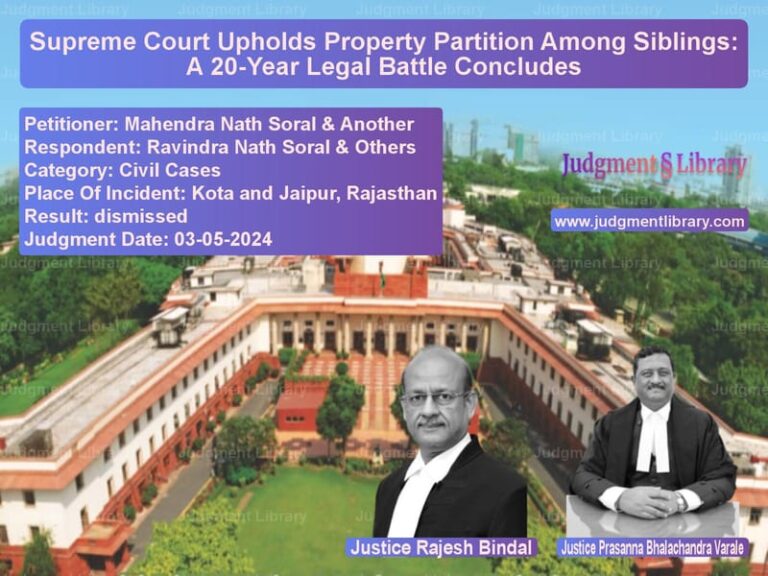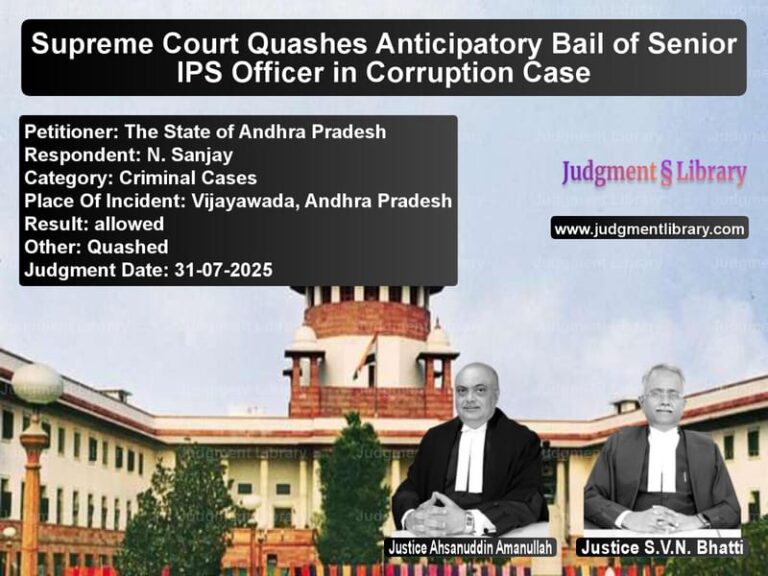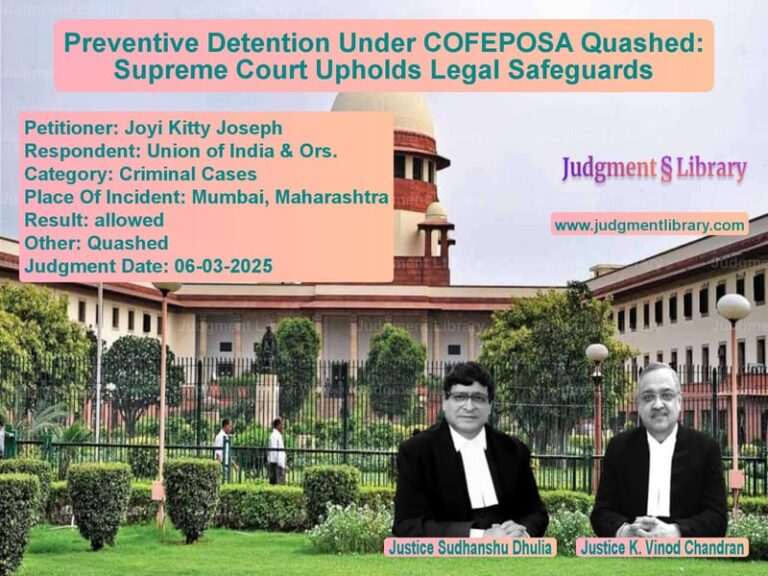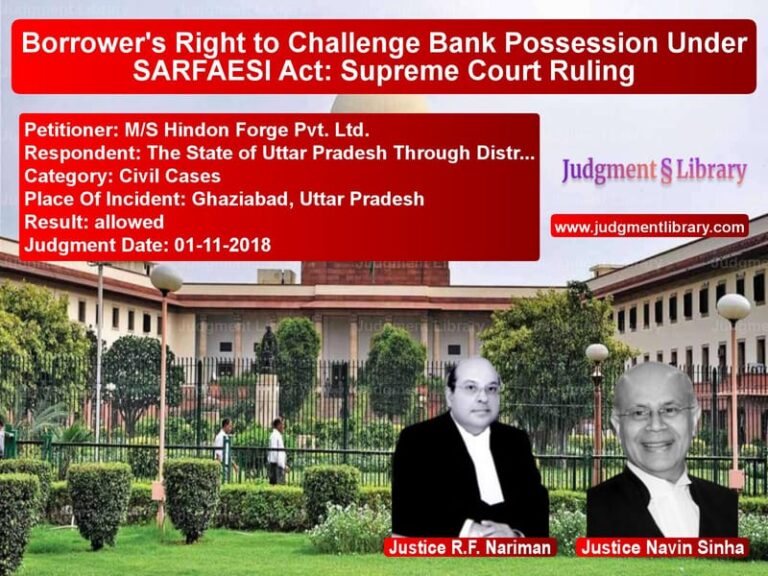Specific Performance Suit: Supreme Court Restores Trial Court’s Decision on Sale Agreement
The Supreme Court of India, in the case of Chennadi Jalapathi Reddy vs. Baddam Pratapa Reddy (Dead) Through LRs. & Anr., addressed the validity of a sale agreement and ruled in favor of the plaintiff seeking specific performance. The judgment highlights the importance of substantive evidence over expert opinions and clarifies the legal principles governing specific performance suits under the Specific Relief Act, 1963.
Background of the Case
The dispute arose from an agreement of sale dated April 20, 1993, related to House No. 1-5-266 (new) situated at Kaman Road, Karimnagar. The plaintiff, Chennadi Jalapathi Reddy, claimed that the first defendant, Baddam Pratapa Reddy, had agreed to sell the property to him and that he was always ready and willing to perform his obligations. However, instead of executing the sale deed, the first defendant and his brother sold their respective shares in the property to the second defendant, Neethi Satyanarayana.
The plaintiff filed a suit for specific performance before the IIIrd Additional District Judge at Karimnagar (O.S. No. 91 of 1996). The Trial Court decreed the suit in favor of the plaintiff, but the Andhra Pradesh High Court reversed the decision, primarily relying on a handwriting expert’s report that questioned the authenticity of the first defendant’s signature on the sale agreement. The plaintiff then appealed to the Supreme Court.
Key Legal Issues
- Whether the agreement of sale was valid and enforceable.
- Whether the High Court erred in relying solely on the handwriting expert’s opinion.
- Whether the plaintiff was ready and willing to perform his part of the contract.
Arguments by the Appellant (Chennadi Jalapathi Reddy)
The appellant contended:
- The sale agreement was genuine, and the Trial Court had rightly relied on substantive evidence from attesting witnesses.
- The High Court gave undue weight to the handwriting expert’s opinion without considering corroborative evidence.
- He had sufficient funds and had continuously expressed his willingness to complete the transaction.
- The receipt for the earnest money payment further supported the validity of the agreement.
Arguments by the Respondents
The respondents countered:
- The sale agreement was forged, as confirmed by the handwriting expert’s report.
- The plaintiff did not prove that he was ready and willing to perform his part of the contract.
- The sale of the property to the second defendant was lawful and should not be disturbed.
Supreme Court’s Observations
1. Preference for Substantive Evidence Over Expert Opinion
The Court ruled that substantive evidence, including testimony from attesting witnesses, should take precedence over expert opinions. It stated:
“The Court must be cautious while evaluating expert evidence, which is a weak type of evidence and not substantive in nature.”
2. Ready and Willingness to Perform the Contract
The Court found that the plaintiff had proven his readiness and willingness to perform his part of the agreement. It observed:
“The plaintiff had sufficient money to pay the balance consideration and had been consistently demanding execution of the sale deed.”
3. Legal Principles Governing Specific Performance
The Court reiterated that a suit for specific performance must satisfy the requirements under Section 16(c) of the Specific Relief Act, 1963. It ruled:
“The plaintiff has specifically averred in his plaint that he was ready and willing to perform his part of the contract, and there is no material on record to suggest otherwise.”
4. Reliability of Attesting Witnesses
The Court noted that the attesting witnesses had provided consistent testimony supporting the plaintiff’s claim. It held:
“The evidence of PWs 1, 2, and 3 fully supports the plaintiff’s case, and there is no reason to disbelieve their testimony.”
Final Verdict
The Supreme Court ruled:
- The judgment of the High Court was set aside.
- The judgment and decree of the Trial Court were restored.
- The plaintiff’s suit for specific performance was allowed.
- The sale of the property to the second defendant was declared null and void.
Conclusion
This judgment reinforces the principle that substantive evidence, such as attesting witnesses’ testimony, should be given greater weight than expert opinions. It also clarifies the legal requirements for specific performance suits and upholds the plaintiff’s right to enforce a valid sale agreement. The ruling serves as an important precedent in property disputes involving contractual obligations.
Petitioner Name: Chennadi Jalapathi Reddy.Respondent Name: Baddam Pratapa Reddy (Dead) Through LRs. & Anr..Judgment By: Justice N.V. Ramana, Justice Mohan M. Shantanagoudar, Justice Ajay Rastogi.Place Of Incident: Karimnagar, Telangana.Judgment Date: 27-08-2019.
Don’t miss out on the full details! Download the complete judgment in PDF format below and gain valuable insights instantly!
Download Judgment: Chennadi Jalapathi R vs Baddam Pratapa Reddy Supreme Court of India Judgment Dated 27-08-2019.pdf
Direct Downlaod Judgment: Direct downlaod this Judgment
See all petitions in Specific Performance
See all petitions in Property Disputes
See all petitions in Contract Disputes
See all petitions in Judgment by N.V. Ramana
See all petitions in Judgment by Mohan M. Shantanagoudar
See all petitions in Judgment by Ajay Rastogi
See all petitions in allowed
See all petitions in Remanded
See all petitions in supreme court of India judgments August 2019
See all petitions in 2019 judgments
See all posts in Civil Cases Category
See all allowed petitions in Civil Cases Category
See all Dismissed petitions in Civil Cases Category
See all partially allowed petitions in Civil Cases Category

